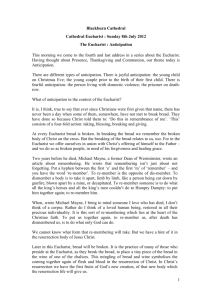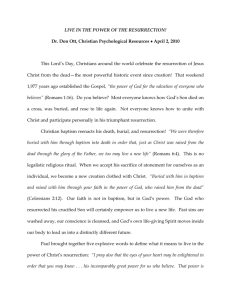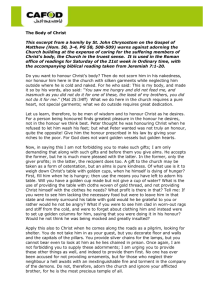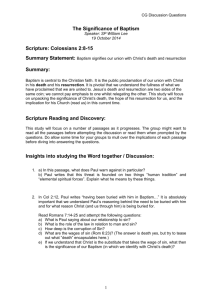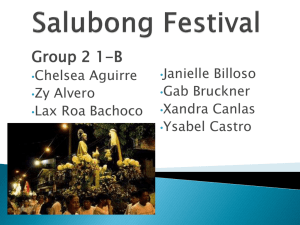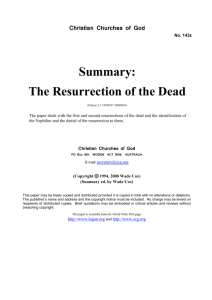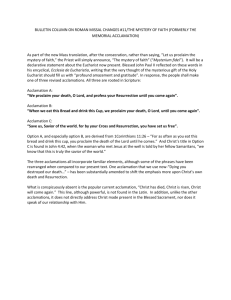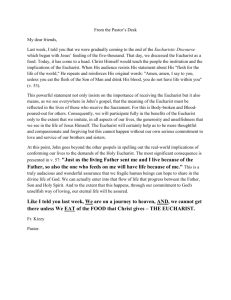Somme Commemoration Service
advertisement
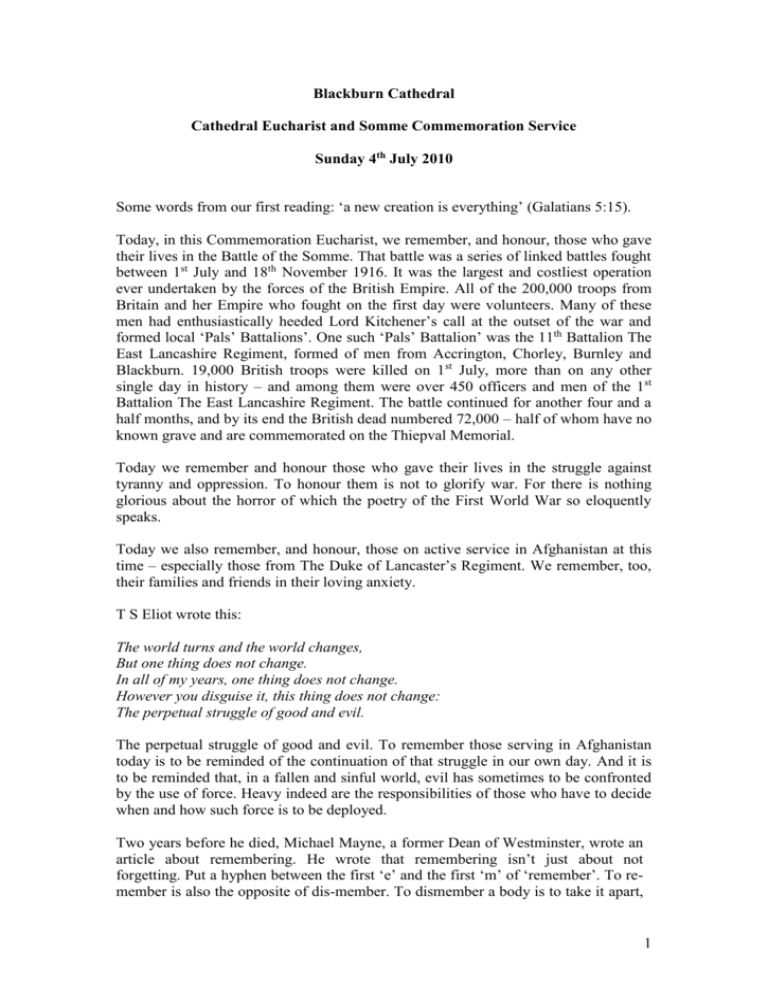
Blackburn Cathedral Cathedral Eucharist and Somme Commemoration Service Sunday 4th July 2010 Some words from our first reading: ‘a new creation is everything’ (Galatians 5:15). Today, in this Commemoration Eucharist, we remember, and honour, those who gave their lives in the Battle of the Somme. That battle was a series of linked battles fought between 1st July and 18th November 1916. It was the largest and costliest operation ever undertaken by the forces of the British Empire. All of the 200,000 troops from Britain and her Empire who fought on the first day were volunteers. Many of these men had enthusiastically heeded Lord Kitchener’s call at the outset of the war and formed local ‘Pals’ Battalions’. One such ‘Pals’ Battalion’ was the 11th Battalion The East Lancashire Regiment, formed of men from Accrington, Chorley, Burnley and Blackburn. 19,000 British troops were killed on 1st July, more than on any other single day in history – and among them were over 450 officers and men of the 1st Battalion The East Lancashire Regiment. The battle continued for another four and a half months, and by its end the British dead numbered 72,000 – half of whom have no known grave and are commemorated on the Thiepval Memorial. Today we remember and honour those who gave their lives in the struggle against tyranny and oppression. To honour them is not to glorify war. For there is nothing glorious about the horror of which the poetry of the First World War so eloquently speaks. Today we also remember, and honour, those on active service in Afghanistan at this time – especially those from The Duke of Lancaster’s Regiment. We remember, too, their families and friends in their loving anxiety. T S Eliot wrote this: The world turns and the world changes, But one thing does not change. In all of my years, one thing does not change. However you disguise it, this thing does not change: The perpetual struggle of good and evil. The perpetual struggle of good and evil. To remember those serving in Afghanistan today is to be reminded of the continuation of that struggle in our own day. And it is to be reminded that, in a fallen and sinful world, evil has sometimes to be confronted by the use of force. Heavy indeed are the responsibilities of those who have to decide when and how such force is to be deployed. Two years before he died, Michael Mayne, a former Dean of Westminster, wrote an article about remembering. He wrote that remembering isn’t just about not forgetting. Put a hyphen between the first ‘e’ and the first ‘m’ of ‘remember’. To remember is also the opposite of dis-member. To dismember a body is to take it apart, 1 limb by limb, like a person being cut down by gunfire, blown apart by a mine, or decapitated. To re-member someone is to do what all the king’s horses and all the king’s men couldn’t do to Humpty Dumpty: to restore him; to put him together again. When, wrote Michael Mayne, I bring to mind someone I love who has died, I don’t think of a corpse. Rather do I think of a loved human being, restored in all their precious individuality. It is this sort of re-membering which lies at the heart of the Christian faith. To put us together again, after death has dismembered us, is to do what only God can do. We cannot know what form that re-membering will take. But we have a hint of it in the resurrection body of Jesus Christ. Later in this Eucharist, bread will be broken. It is the practice of many of those who preside at the Eucharist, as they break the bread, to place a tiny piece of the bread in the wine of one of the chalices. This mingling of bread and wine symbolises the coming together again of flesh and blood in the resurrection of Christ. In Christ’s resurrection we have the first fruits of God’s new creation. The Christian Gospel speaks of the new Jerusalem coming down to earth out of heaven, of bringing ‘the life of heaven to birth in actual, physical, earthly reality......’ (Tom Wright Surprised by Hope, p305). With Christ’s resurrection, ‘God’s new creation is launched upon a surprised world, pointing ahead to the renewal, the redemption, the rebirth of the entire creation’ (p306). In the resurrection life of Jesus a glimpse is seen of that new creation which is the taking up and transforming of this first creation so that the kingdoms of this world may become the kingdom of our God and of his Christ. The Christian faith speaks of a God who created us and who can and will re-create us, re-member us. It speaks of a God who in Jesus Christ has entered the human condition; who is alongside us in our pains and griefs; and who suffers in and with his creation, and not least when the human family, made in God’s image but falling so short of his likeness, is engaged in conflict and strife. And it speaks of a God who calls us to work with him in the task of re-creating, of re-membering, of building his Kingdom on earth. That task must begin with individuals like you and me – in such a way that, as Canon Chivers, the Canon Chancellor here, has written, ‘a fallen world of darkness shimmers once more with flickers of the divine light refracted through people and places where real re-membrance has happened or is happening’. One final thing. Two years ago I took part in a school visit to some of the First World War battlefields and cemeteries. One of the sites we visited was the Canadian Memorial on Vimy Ridge. At the base of that large edifice is a figure turning a sword into a ploughshare. The carving portrays the vision of Isaiah, of swords being beaten into ploughshares and spears into pruning-hooks; of nation not lifting sword against nation, nor ever again being trained for war – words we will hear as one of the anthems later in this service. The Canadian Memorial expresses for me the vision which the Christian Gospel has for our world – a vision of a world re-membered. We need that vision. And we need, above all, the God who can re-member us – all 2 humanity and the whole created order – in the kingdom of his peace, in that kingdom which is his will, his gift and the very purpose of his creation. Amen. The Revd Steven Harvey 3
